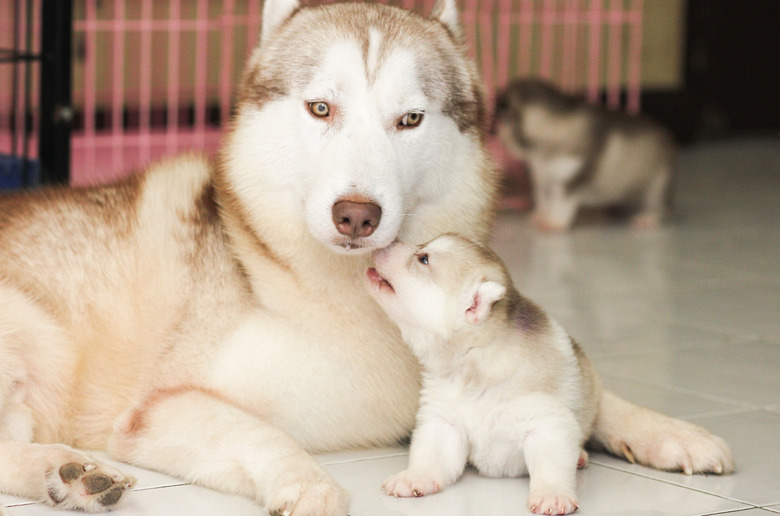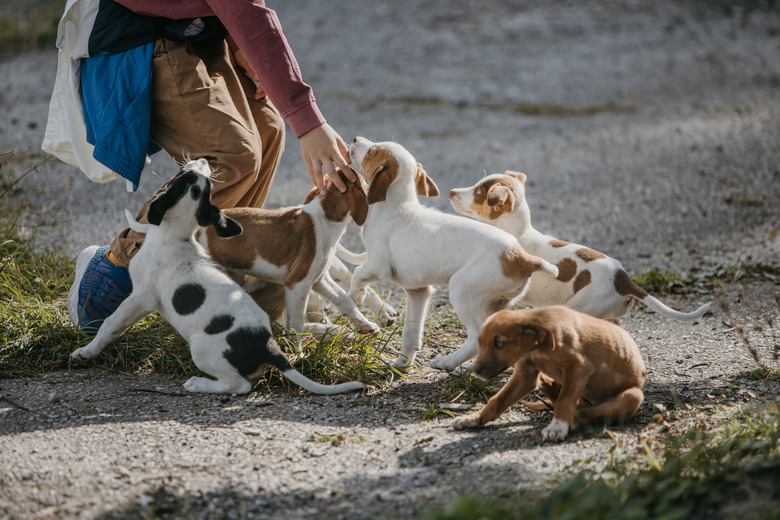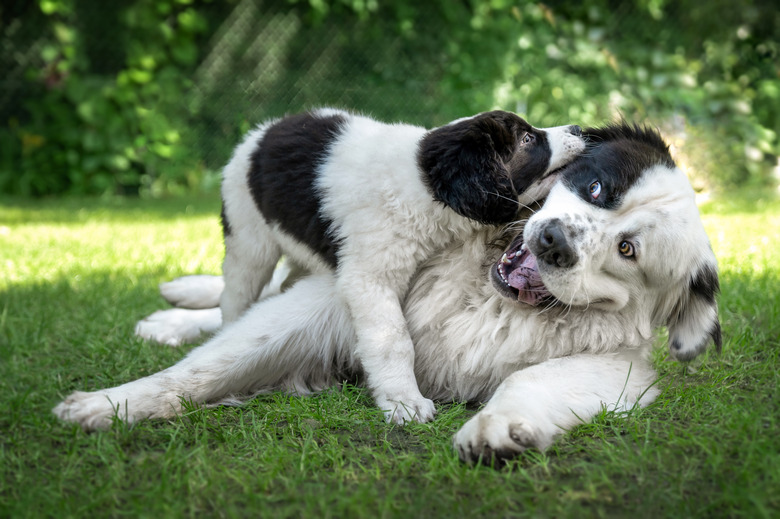How Will The Male Dog React To The Newborn Puppies?
A mother dog is typically going to care for and protect her litter of puppies as soon as they are born, but this is not always true of other male dogs in the home. The mother dog is going to lick the newborn puppies immediately after giving birth. She will provide her family members with the milk and nutrition they need to survive. Male dogs, however, might react differently.
As the new puppies get older, the mother dog will be very protective of them, which includes being wary of other dogs, including the father of her puppies. The female dog developed maternal instincts throughout her dog gestation period, and she's usually willing to keep up with that motherly role until the puppies are old enough to grow up and become independent.
Keeping the father dog away
Keeping the father dog away
Do male dogs know there is a new litter of puppies in the house? Yes, but that doesn't mean he will have the paternal instinct to take care of them. Instead, there are a number of ways the male might react. He may sniff the litter of puppies, want to play with them, hang out with them, or even bark or growl at them.
Since adult male dogs can be very playful, this could be harmful to the new puppies, who can barely move in the first few weeks of their life. For this reason, it's best to avoid the dogs meeting and keep the male dog at a distance for weeks.
For the safety of the young puppies, male dogs should be kept away until at least 4 weeks of age, when the puppies are starting to wean. However, before introducing puppies at 4 weeks old or older, make sure the male dog is fully vaccinated; is not showing any signs of illness, like vomiting, coughing, or diarrhea; and has not been recently exposed to any sick dogs.
Protective mother dog behavior
Protective mother dog behavior
The mother dog might seem more aggressive or uneasy than normal because she is protecting her puppies. Introducing a male dog may evoke some level of aggression and might even lead to injury. Your female dog might growl at the male or even try to fight him. If the puppies get caught in the middle, this could end up being a bad situation. Immediately remove the other dog if there is any sign that the mother dog is stressed, anxious, or becoming aggressive.
Even female dogs who were never aggressive prior to having newborn puppies could demonstrate aggression in this situation. Furthermore, allowing the male or any other dog to get too close too soon can stress the mother dog. That's another reason it's important to keep the male dog separated from the new mother and puppies, especially while the puppies are still nursing.
Do father dogs get mean when meeting new puppies?
Do father dogs get mean when meeting new puppies?
When you eventually introduce the male dog for the first time, he should be up to date on his shots so he can't accidentally make the puppies sick. Second, introduce puppies to the male dog individually in a neutral space. Always closely supervise the interaction and intervene if the puppy could be hurt or the male dog is responding negatively.
If the interaction is positive and done at the right age, introducing the male dog to his puppies can be beneficial for socialization purposes. The puppies are learning how to interact with other dogs. During the time they're too young to go to a dog park, they can experience necessary social interaction with their dog dad instead.
Additional precautions for newborn puppies
Additional precautions for newborn puppies
To keep the newborn puppies safe after whelping, dog owners need to keep the mother and her litter of puppies in a comfortable room or pen where they cannot escape but will still have enough room to move around. She is going to initially clean up after them, but make sure their living area is clean and free from feces and urine at all times.
You'll need to ensure the mother is well fed during this time and that all dogs are getting a chance to nurse and receive adequate nutrition. Consult a veterinarian if you think any puppies are not eating enough to gain weight. Puppies should be examined by a veterinarian within the first week after birth to ensure there are no physical abnormalities, such as a cleft palate, that could affect their ability to acquire nutrition.
If you notice that any dogs are not latching on to the mother properly, you might need to assist them. However, thoroughly wash your hands before handling any puppies. If puppies are not able to nurse, they may need to be bottle fed. Consult your veterinarian for instructions if this situation occurs.
Handle puppies with caution
Handle puppies with caution
Because puppies are susceptible to sickness before they are given their shots at 6 to 8 weeks old, you and any visitors need to thoroughly wash your hands prior to handling young puppies. Furthermore, do not allow visitors who have unvaccinated or sick dogs at home since clothes and shoes can carry infections, like parvovirus.
Finding homes for puppies
Finding homes for puppies
Wherever you send the puppies, make sure they are going to loving homes. You'll want the other dogs in the home to not be aggressive toward the puppies since they will still be vulnerable at a few months old. When finding homes for puppies, never use advertising websites like Craigslist, and make sure to thoroughly evaluate potential homes. Ask for references, make a home visit, and require that adopters spay or neuter the puppies.
Also spay and neuter your own male and female dogs. This will not only prevent potential future serious health problems, but also help to address the pet overpopulation problem.
The bottom line
The bottom line
Most mother dogs will instinctively be protective of their newborn puppies, and some seemingly aggressive animal behavior can be expected. Keep the male dog and others away from the litter of puppies until they are at least 4 weeks old and beginning to wean. When eventually introducing the puppies to the male dog, make sure the male dog is vaccinated, healthy, and well supervised. Watch for aggressive behavior because you can't assume a male dog will accept his own puppies or have paternal instincts.


